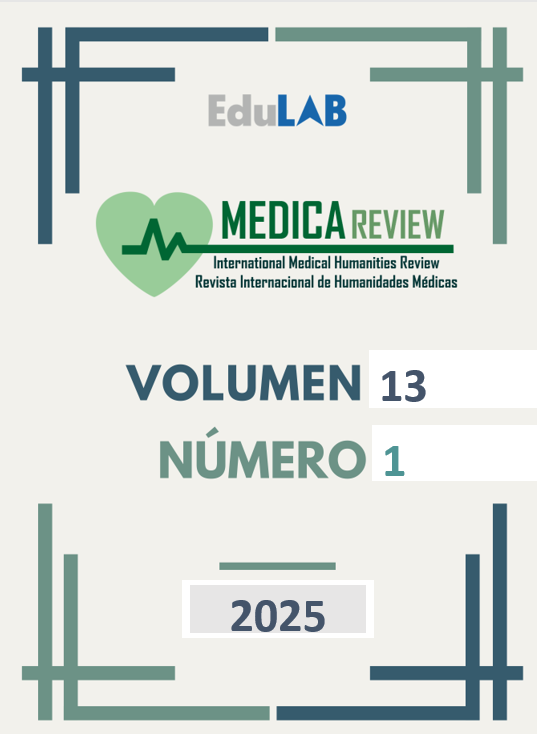Vivencias y emociones de enfermeras en el cuidado de pacientes críticos
DOI:
https://doi.org/10.62701/revmedica.v13.5437Keywords:
vivencias, emociones , enfermería, pacientes críticos, cuidados intensivosAbstract
Objective: To analyze and systematize the scientific evidence on the experiences and emotions of nurses in the care of patients with life-threatening conditions. Methods: Systematic review. A search of the Cochrane Library Plus and databases in PubMed, SciELO, LILACS, Medline, Scopus, and Sciencedirect on the topic from 2010 to 2020. Ten articles that met the inclusion criteria were reviewed. Conclusions: Caring for patients with life-threatening conditions places high psychological and physical demands on the nurse's role due to various factors such as experiencing patient suffering, making decisions under pressure, hours of dedication to the patient, length of stay in intensive care units, fear of contagion, family support and guidance, causing significant emotional exhaustion with a significant physical and psychological burden.Global Statistics ℹ️
|
473
Views
|
486
Downloads
|
|
959
Total
|
|
References
Andreu, D., Ochando, A., & Limón, E. (2020). Experiencias de vida y soporte percibido por las enfermeras de las unidades de hemodiálisis hospitalaria durante la pandemia de COVID-19 en España. Enfermería Nefrológica, 2, 148–159. https://doi.org/10.1016/j.enfnefr.2020.03.005
Aromataris, E., & Munn, Z. (Eds.). (2020). JBI manual for evidence synthesis. JBI. https://doi.org/10.46658/JBIMES-20-01
Braun, V., & Clarke, V. (2006). Using thematic analysis in psychology. Qualitative Research in Psychology, 3(2), 77–101. https://doi.org/10.1191/1478088706qp063oa
Danet, A., & Jiménez, P. (2019). Vivencias y emociones profesionales en el proceso de donación y trasplantes de órganos: Una revisión sistemática. Cirugía Española, 97(7), 364–376. https://doi.org/10.1016/j.ciresp.2019.01.009
Fawcett, J. (2005). Contemporary nursing knowledge: Analysis and evaluation of nursing models and theories (2nd ed.). F.A. Davis.
Fernández-Aedo, I. (2017). Experiencias y emociones de los técnicos y enfermeras de emergencias extrahospitalarias tras la reanimación cardiopulmonar con resultado de muerte. Enfermería Intensiva, 28(2), 57–63. https://doi.org/10.1016/j.enfi.2017.01.001
Gálvez González, M. (2011). El final de la vida en la Unidad de Cuidados Intensivos desde la perspectiva enfermera: Un estudio fenomenológico. Enfermería Intensiva, 22(1), 13–21. https://doi.org/10.1016/j.enfi.2010.11.001
Higgins, J. P. T., Thomas, J., Chandler, J., Cumpston, M., Li, T., Page, M. J., & Welch, V. A. (Eds.). (2022). Cochrane handbook for systematic reviews of interventions (2nd ed.). Wiley. https://doi.org/10.1002/9781119536604
Meleis, A. I. (2010). Transiciones en la salud: Un marco de referencia para la práctica, la investigación y la educación. Elsevier.
Minchala, R., Estrella, M., & Prieto, E. (2020). Vivencias y emociones del personal de enfermería con pacientes Covid-19. Revista Ocronos, 3(1). https://doi.org/10.5281/zenodo.4675019
O’Boyle, C., Robertson, C., & Secor-Turner, M. (2006). Nurses’ beliefs about public health emergencies: Fear of abandonment. American Journal of Infection Control, 34(6), 351–357. https://doi.org/10.1016/j.ajic.2006.01.012
Ramos, M. (2013). El cuidado hasta la muerte: reflexiones desde la práctica enfermera. Revista Latino-Americana de Enfermagem, 21(3), 607–615.
Rodríguez, M., Silva, D., & Poles, K. S. R. (2013). Desvelando o cuidado humanizado: Percepções de enfermeiros em oncologia. Texto & Contexto Enfermagem, 22(3). https://doi.org/10.1590/S0104-07072013000300003
Vivar, C., Orecilla, E., & Gómara, L. (2009). “Es más difícil”: Experiencias de las enfermeras sobre el cuidado del paciente con recidiva de cáncer. Enfermería Clínica, 19(6), 314–321. https://doi.org/10.1016/j.enfcli.2009.05.006
Yujeong, J. (2021). Nurses' response and preparedness for disaster: Implications for public health emergency management. Journal of Nursing Scholarship, 53(2), 125–134. http
Downloads
Published
How to Cite
Issue
Section
License
Those authors who publish in this journal accept the following terms:
- Authors will keep the moral right of the work and they will transfer the commercial rights.
- After 1 year from publication, the work shall thereafter be open access online on our website, but will retain copyright.
- In the event that the authors wish to assign an Creative Commons (CC) license, they may request it by writing to administracion@edulab.es









